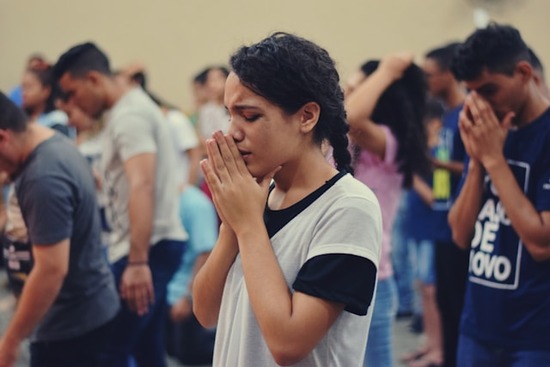No, Adventists definitely don’t believe they’re the only ones that will go to heaven. As a matter of fact, we don’t believe admittance into heaven is ever based on which church or denomination we belong to. People all over the world from different Christian denominations, religions, and walks of life will be welcomed by Jesus Christ.
This is because Scripture is clear that salvation is not dependent on fulfilling a certain list of requirements or being part of a certain club. It’s about knowing Jesus in a personal way (Matthew 7:22-23; John 17:3).
Join us as we answer:
- Is it necessary to be a Seventh-day Adventist to go to heaven?
- Do I have to be part of the remnant to go to heaven?
- What does the Bible say about who will go to heaven?
Is it necessary to be a Seventh-day Adventist to go to heaven?

Photo by Igor Rodrigues on Unsplash
Church membership, whether in the Seventh-day Adventist Church, Baptist Church, or some other denomination, doesn’t determine whether we end up in heaven. This is because our entry into heaven depends on our relationship with Jesus Christ. We believe in Him and receive from Him the gift of eternal life (Acts 16:31).
The tricky thing is, we as human beings tend to put so much emphasis on being part of a specific group that we forget membership in a certain faith community doesn’t necessarily mean anything. We could be part of a community but lack what matters most—a personal connection with God.
We could believe every doctrine of a specific church and follow the Ten Commandments to the letter but not have faith in Jesus, the Son of God—which is the only way to be saved (Ephesians 2:8-9).
Now, you may be wondering, What about being part of the remnant? You may have heard Adventists talk about this, and you’re wondering how that relates to salvation.
Let’s take a look at that next.
Do I have to be part of the remnant to go to heaven?

Image by Gerd Altmann from Pixabay
Adventists understand that all throughout history, there has always been a remnant—a group of people who choose to be faithful to God when society pressures them to cave. The remnant is not a group or church we “join” but rather a description of people faithful to Jesus. Revelation 14:12 describes a remnant in the end times who will help to warn the world of its final crisis.
One of the 28 Fundamental Beliefs, or foundational teachings of Seventh-day Adventism, summarizes the subject like this:
“The universal church is composed of all who truly believe in Christ, but in the last days, a time of widespread apostasy [turning away from the truth of God], a remnant has been called out to keep the commandments of God and the faith of Jesus. This remnant announces the arrival of the judgment hour, proclaims salvation through Christ, and heralds the approach of His second advent. This proclamation is symbolized by the three angels of Revelation 14; it coincides with the work of judgment in heaven and results in a work of repentance and reform on earth. Every believer is called to have a personal part in this worldwide witness.”1
The remnant in the last days
This concept of the remnant in the last days comes from our belief that at that time, the Great Controversy (the battle between good and evil, God and Satan) will come to a head in a crisis of worship. This crisis will divide everyone on earth into two groups—those who remain faithful to God and those who choose to follow human-made rules.
Bible prophecy represents these two groups as the faithful church of God and the unrighteous church of Babylon.
But note:
Church in the Bible doesn’t mean a building or a denomination. It refers to the body of believers in Christ.
The New Testament describes this church with the symbol of a pure woman, protected by God (Revelation 12:1, 6). Meanwhile, Revelation uses an unfaithful, adulterous woman called Babylon to represent the religious confusion through which Satan leads the world astray (Revelation 17:2-6).
Before Jesus comes, what’s left of the true church of God is called the remnant in the King James Version of the Bible (Revelation 12:17).
According to both Revelation 12:17 and 14:12, these people:
- Keep the commandments of God
- Have the testimony of Jesus
They will be a small group of God’s faithful followers who resist the false teachings of Satan’s counterfeit religion by following God’s law and holding onto the testimony and faith of Jesus.
To be clear, though, these followers don’t keep the commandments to earn salvation. Consistent with the rest of the Word of God (Ephesians 2:8-10; Romans 3:24), this passage simply describes what they do as a result of receiving Jesus’ salvation.
Although the Bible is clear that a remnant will have a special role at the end of time, the concept of a remnant is hardly new.
The remnant throughout the Bible
 Some of the earliest stories in the Bible talk about small groups of people who remained loyal to God and pointed others to His truth.
Some of the earliest stories in the Bible talk about small groups of people who remained loyal to God and pointed others to His truth.
One example in the Old Testament is the story of Noah and his family.
They were the only people who remained faithful to God in a wicked world. And they had a mission—to warn the people of the Earth of the impending flood (Genesis 6:5–7).
Similarly, the remnant who live right before Jesus comes will have a special warning known as the three angels’ messages (Revelation 14:6–12, 14). It’s a call for people to come out of religious confusion and glorify God as our Creator. It’s also a warning about false systems of worship.
Seventh-day Adventists seek to be part of this group of people, but they understand that the Bible doesn’t consider this group to be exclusive. All who follow Jesus faithfully will be part of it in the end times.
What does the Bible say about who will go to heaven?
One of the most well-known passages in the Bible emphasizes the truth about salvation that we find throughout its pages—“whoever believes in Him should not perish but have everlasting life” (John 3:16, NKJV). Belief in Jesus Christ is the prerequisite for heaven (Romans 10:9–13).
This belief isn’t simply a belief in God’s existence, however (James 2:19). It’s about trusting Him and His power to save us through a personal relationship with Him. That’s why John 17:3 tells us that knowing Jesus Christ is the essence of eternal life.
It’s the kind of faith and love for Him that motivates us to follow Jesus—not out of a need to earn His favor but because we already have His favor. And this faith and love are revealed through obedience (John 14:15).
So, being ready for heaven all comes down to the process of justification and sanctification.
We’re justified (forgiven and cleansed) when we accept Jesus’ sacrifice for our sins (Romans 3:38; 1 John 1:9). That begins the process of sanctification—or growth—as we daily surrender our hearts to God. Neither of these stages is about earning heaven. Rather, they both involve a conscious decision to accept Jesus’ payment for the wages of sin and surrender to following His will.
God wants everyone in heaven
God offers the gift of eternal life to everyone—regardless of denomination. His greatest desire is for all of us to be saved (1 Timothy 2:4–6), and it pains Him when people choose to turn away from His gift (Ezekiel 33:11).
He sees each of us as individuals. He sees the condition of our hearts and where we’re at on our spiritual journeys. And with that in mind, He guides us to a deeper understanding of truth.
We might not all be in the same place on our journeys.
We might not come to the same conclusions on every topic.
But God sees us for who we are, meets us where we’re at, and promises to help us grow into the people He made us to be.
Want to better understand Seventh-day Adventist beliefs about salvation?
Related pages
- “What Adventists Believe About the Remnant in the Bible,” Seventh-day Adventist World Church, https://www.adventist.org/remnant-and-its-mission/. [↵]
More Answers
Adventist Pastors
What is the role of a pastor in the Adventist Church? The position itself, at least as far as a local congregation is concerned, is not much different from that of pastors in other protestant denominations.
The Leadership Structure of the Seventh-day Adventist Church
The Seventh-day Adventist Church has a representative form of structure that connects its 90,000-plus congregations across the globe and gives its members a part in decision-making. Though the Church was incorporated in 1863, this system came about during the church’s reorganization from 1901 to 1903. It includes four levels of organization.
Everything You Need to Know About Sabbath Meals
For Seventh-day Adventists, sharing a Sabbath meal with friends and family is one of the most special and memorable parts of the Sabbath.
What to Expect When You Go to an Adventist Church
If you’re attending an Adventist church for the first time, you may wonder what it’s really like. While each Adventist church is unique in its collective personality and local culture, Adventist church services are generally similar to most other Protestant church services.
Adventist Education
Seventh-day Adventists have historically upheld the importance of a well-rounded, high-quality education. Instead of a one-size-fits-all approach to teaching and learning, the Adventist Education system operates on the principle of educating the “whole” person.
Evangelism
Evangelism is simply sharing the truths of the Bible with someone else. And Adventists are all into it.
Everything You Need to Know About an Adventist Church Potluck
Every so often, usually on a schedule ranging from once a week to once a month to once a quarter, an Adventist church will have “fellowship dinners,” often casually referred to as potlucks.
The Seventh-day Adventist Hymnal
The Seventh-day Adventist Hymnal is a songbook used worldwide by many Adventist congregations during their worship services. Since its publication in 1985, it has helped foster praise to God while reminding church members of our mission and drawing them closer to Jesus.
Everything You Need to Know about Sabbath School
Sabbath School is the Bible study component of the church program at most Seventh-day Adventist Churches. It’s a time of Bible study on a specific topic or lesson. Instead of listening to a preacher, people interact with one another, making it a great opportunity for building friendships.
What Are Seventh-Day Adventist Sermons Like?
In nearly every Seventh-day Adventist Church, the sermon is the focal point of the main service—similar to many Protestant Christian denominations. It is a time of biblical instruction by the pastor, who shares what they’ve been studying in the Bible and preparing over the previous week.
Who Are Adventists
The Seventh-day Adventist Church—“Adventists” for short—is a Christian denomination of ordinary people who seek to follow Jesus and live out His mission in this world. Established in 1863, we hold to the Protestant principle of sola scriptura, which means the Bible guides everything we do.
How do Adventists choose what to eat?
Food blogs overwhelm the internet; food fads are all the rage; and copycat and healthy versions of food are the subject of many a get-together.
Didn’t find your answer? Ask us!
We understand your concern of having questions but not knowing who to ask—we’ve felt it ourselves. When you’re ready to learn more about Adventists, send us a question! We know a thing or two about Adventists.
















